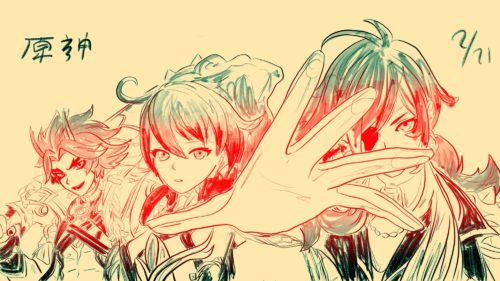Friday Song: Erguna Band, the Inner Mongolian folk band that went mainstream

In the summer of 2001, four young college students from Inner Mongolia spontaneously formed a band and named themselves after the great Ergune (or Argun) River that marks a border between China and Russia. Erguna Band (额尔古纳乐队 É’ěrgǔnà yuèduì) aimed to bring the music of its northern homeland to greater public attention, and in 2005, it did just that, breaking into the national mainland music scene when it arrived in Beijing with its song “Swan Goose” (鸿雁 hóngyàn), about childhood on the wild grasslands. It captivated the country with its fresh, honest, and traditional folk music.
Today, Erguna Band is still well-known and oft-covered. Another of its iconic songs is “Moni Mountain,” (莫尼山 mòní shān), a ballad with sweeping vocals that evokes the awe-inspiring openness of Mongolia and northern China (even without the fuzzy pre-2010’s montage music video).
Erguna Band’s rise and place in the canon of contemporary Chinese music might be surprising, given how non-mainstream its sound is. But in many ways, its popularity also isn’t. Its songs’ evocation of pastoral idyll and untampered traditional lifestyles can be especially welcome in this day and age. The earnest grandeur of Erguna Band’s folk music — and its maturity and agelessness — is also enough to capture the listener.
The lyrics of “Moni Mountain” are simple and repetitive, which contributes to the cohesiveness of the entire piece; especially as they return again and again to “连绵” (liánmián) and “不断” (bùduàn), meaning “continuous” or “unbroken,” they mirror the landscape they aim to capture.
莫尼山 Mòní Shān
风吹过青草连绵
Fēng chuī guò qīng cǎo lián mián
The wind blows over the endless green grass
莫尼山伫立在眼前
Mò ní shān zhù lì zài yǎn qián
Ahead, Moni Mountain stands
巍峨身躯高入云端
Wéi’é shēn qū gāo rù yún duān
Grand and tall, into the clouds
守护着我们的平安
Shǒu hù zhe wǒ mén de píng ān
Guarding our peace
乌日图河水甘甜
Wǔ rì tú hé shuǐ gān tián
The water of Wuritu River runs sweet
静静的涌出山涧
Jìng jìng de yǒng chū shān jiān
Quietly flowing through the valley
灌溉了我们的家园
Guàn gài le wǒ mén de jiā yuán
Nurturing our homeland
沉默的流淌从未改变
Chén mò de liú tǎng cóng wèi gǎi biàn
Silently flowing, never changing
莫尼山连绵不断
Mò ní shān lián mián bù duàn
Moni Mountain, continuous, unbroken
宛如神圣的诗篇
Wǎn rú shén shèng de shī piān
Like a sacred poem
教我善良和勇敢
Jiào wǒ shàn liáng hé yǒng gǎn
Teaching me kindness, teaching me courage
撑起草原的蓝天
Chēng qǐ cǎo yuán de lán tiān
Holding up the blue sky over the grasslands
风吹过青草连绵
Fēng chuī guò qīng cǎo lián mián
The wind blows over the endless green grass
莫尼山伫立在眼前
Mò ní shān zhù lì zài yǎn qián
Ahead, Moni Mountain stands
巍峨身躯高入云端
Wéi’é shēn qū gāo rù yún duān
Grand and tall, into the clouds
守护着我们的平安
Shǒu hù zhe wǒ men de píng ān
Guarding our peace
莫尼山连绵不断
Mò ní shān lián mián bù duàn
Moni Mountain, continuous, unbroken
宛如神圣的诗篇
Wǎn rú shén shèng de shī piān
Like a sacred poem
教我善良和勇敢
Jiào wǒ shàn liáng hé yǒng gǎn
Teaching me kindness, teaching me courage
撑起草原的蓝天
Chēng qǐ cǎo yuán de lán tiān
Holding up the blue sky over the grasslands
莫尼山高入云端
Wéi’é shēn qū gāo rù yún duān
Moni Mountain, high into the clouds
看千年岁月流转
Kàn qiān nián suì yuè liú chuán
As countless years flow by
任时光慢慢走远
Rèn shí guāng màn màn zǒu yuan
As time moves ever distant
静静守候着草原
Jìng jìng shǒu hòu zhe cǎo yuan
Quietly keeping watch over the grasslands
任时光慢慢走远
Rèn shí guāng màn man zǒu yuan
As time moves ever distant
静静守候着草原
Jìng jìng shǒu hòu zhe cǎo yuán
Quietly keeping watch over the grasslands
The lyrics “守护” (shǒu hù) and “守候” (shǒu hòu) are used throughout the song to reflect each other in sound, but also to add depth to the song’s meaning. “守护” is the simpler term, meaning only “to guard,” but “守候” is somewhat more layered — it also means “to guard,” or the most direct translation, “to wait” or “to keep watch.” It’s akin to “holding down the fort” while everyone else is away, expectant and patient and vigilant all at once.
Friday Song is SupChina’s weekly sign-off. Let us know what you thought of the week that was in the comments below, or email editors@thechinaproject.com.





